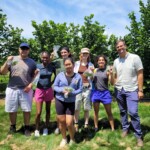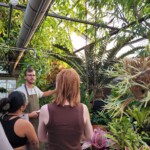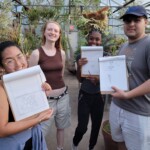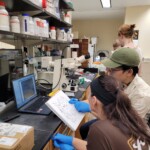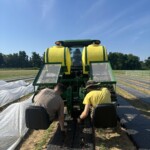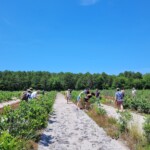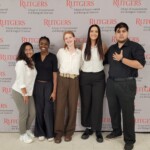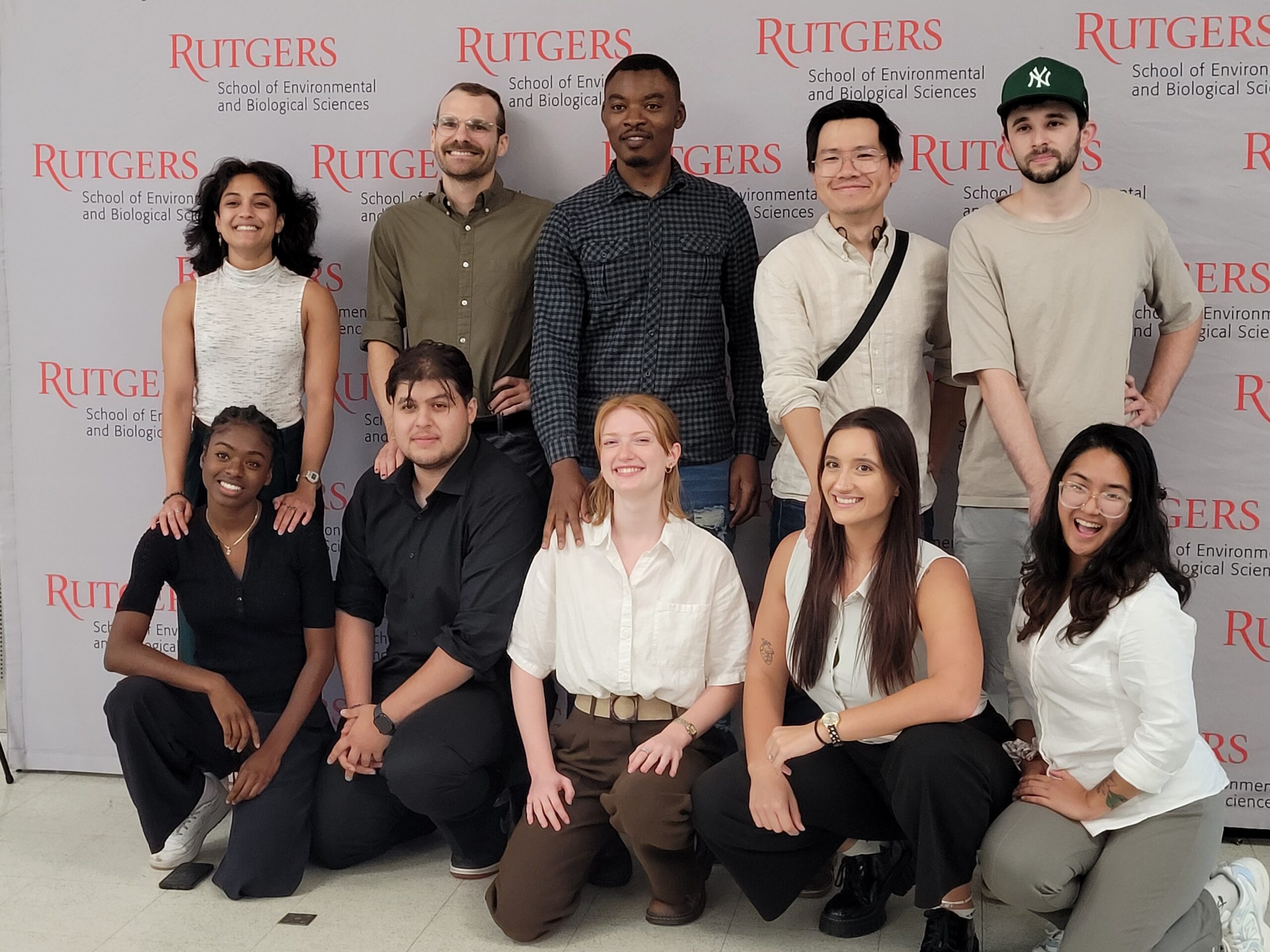
BCC students (front row) at the Experiential Learning Program closing ceremony this summer with their respective Rutgers Ph.D. mentors. L-R: Radhika Patel and Shanandra Ubiera; Alex Barrett and Abdullah Alwan; Idrice Kue Foka and Liliana Hopkins; Peerapol Chiaranunt and Ana Rumora,; and Sean Lindert and Micah Mendoza.
Rutgers School of Environmental and Biological Sciences (SEBS) has partnered with Bergen Community College (BCC) as part of a five-year, $4.5 million grant, New Jersey NextGen for Sustainable Farming, awarded to BCC by USDA’s National Institute of Food and Agriculture (NIFA).
Supported by funding under USDA-NIFA’s NextGen program, SEBS provides a residential Experiential Learning Program (ELP) for BCC students to conduct research in laboratories of faculty in the Department of Plant Biology. Under ELP, which will continue through 2027, BCC students gain research credits that apply to experiential learning requirements for students enrolled at SEBS.
In addition, the NextGen grant establishes a 2+2 transfer articulation agreement that allows for the smooth transition for BCC students achieving an associate’s degree to complete two additional years of study at SEBS and earn a bachelor’s degree.
“The NextGen experiential learning program provides an excellent model for exposing two-year college students to possible agriculture-related career opportunities that expand well beyond “farming,” including many of the majors offered at SEBS. It serves as a great mechanism to recruit potential transfer students to our school,” said Don Kobayashi, professor and chair of the Department of Plant Biology.
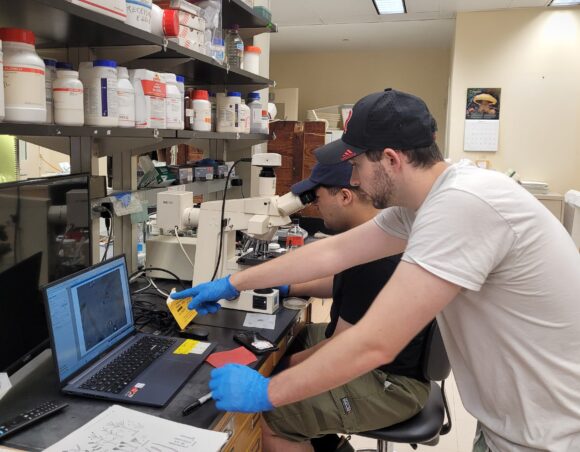
BCC student learning how to prepare samples from diseased plants and using a microscope and other tools to identify plant diseases in Prof. James White’s lab with Rutgers Ph.D. mentor Sean Lindert.
According to Nrupali Patel, assistant dean of academic projects and director of the undergraduate program in Plant Science at SEBS, the three-week ELP was successfully inaugurated this summer with five BCC students paired with a Ph.D. student from the Plant Biology Graduate Program for one-on-one laboratory research project mentoring.
“The BCC students were able to experience modern methodologies and hypothesis-driven research through the guidance of Rutgers doctoral students in state-of-the art labs, while also experiencing on-campus student life at a four-year institution,” explained Patel.
The students engaged in research related to plant pathology, plant genetic engineering, plant breeding or plant endophytes, all areas of focus of their doctoral student mentors. For completing the program, BCC students also receive 2 credits of experiential learning that will fulfill curriculum requirements at SEBS.
Liliana Hopkins and Ana Rumora, two of the BCC students who participated in ELP this summer, are now enrolled at SEBS this fall and have already accumulated 2 credits each towards their graduation with a bachelor’s degree from Rutgers.
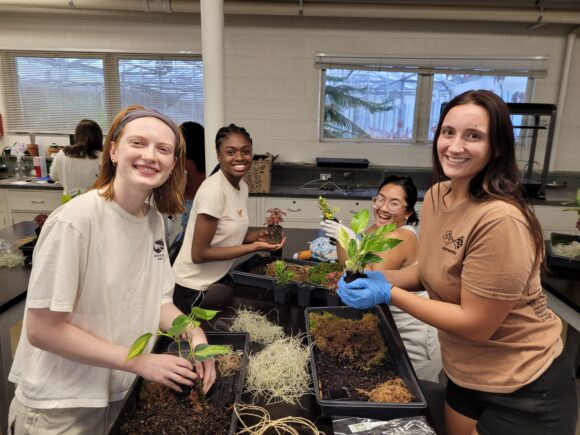
L-R, foreground, Liliana Hopkins and Ana Rumora, who transferred to SEBS this fall, along with two of their BCC colleagues, Shanandra Ubiera and Micah Mendoza, during a Horticultural Therapy Workshop at the Rutgers Floriculture Greenhouse on the Cook campus.
Hopkins, a Biotechnology major, shadowed a Rutgers graduate student working on agricultural genetic engineering for the three-week internship. “This gave me firsthand experience of what a career in biotechnological academic research looks like. Not only did I receive personalized guidance from my graduate student mentor, but I was also supported by the entire graduate cohort,” she said.
Rumora, who is pursuing a degree in Biochemistry, saw the networking and connections as central to her committing to transfer to Rutgers. “I acquired valuable laboratory skills, particularly in working with fungi, including culturing and identification. One highlight of the program was interacting with graduate students and gaining insights from their experiences. Networking was also a significant aspect for me, especially as I prepared to transfer to Rutgers this fall. The ELP provided me the opportunity to explore different labs and establish connections.”
A third BCC student, Abdullah Alwan, transferred to Rutgers School of Arts and Sciences, underscoring the success of the first ELP experience under the BCC-Rutgers articulation agreement.
Patel expressed her satisfaction with the inaugural ELP as it offered such “an immersive experience that it enabled the students to visualize themselves as full-time students at a 4-year institution like Rutgers. Plus, the experience of staying in the Starkey dorms, exploring the different campuses, bonding with other Rutgers students on campus, taking the bus and eating at local New Brunswick restaurants really had an impact.”
Hopkins, one of the two transfer students to SEBS from Bergen Community College, confirmed this.
“Beyond the research, I got a taste of student life at Rutgers—living on Cook/Douglass campus, having lunch at the Cook farmers market and touring the hazelnut farms. The students and program advisors made my transition from community college to Rutgers seamless and welcoming. Even before my first day of classes, they helped me plan my course schedule, find the right research lab and choose a major that aligned with my professional goals.”
Rumora, who joined Hopkins on the SEBS campus this fall, expressed her gratitude at being a part of such a transformative experience and agreed that immersing herself in the campus environment made a big difference.
“I’m so grateful for the opportunity to participate in the Next Gen program. It not only helped me develop technical skills but also introduced me to research opportunities I might never have discovered on my own. When I applied to SEBS as a biochemistry major, I primarily chose it for the focus on hands-on learning. Having the chance to be on campus and immerse myself in the community has been incredibly valuable.”

